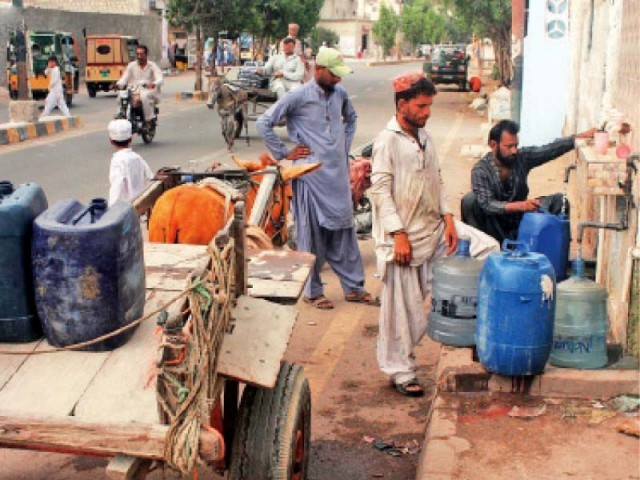Departmental inefficiency : Residential areas’ water crisis exacerbated
Illegal connections into bulk pipelines by businesses, industries has disrupted supply

While Sindh may be flooded, a water crisis is crippling daily life in residential areas of Karachi owing to illegal connections in the city’s water supply system by businesses and industrial zones.
Decreasing groundwater levels in one part of the city means that other groundwater sources will be tapped, which leads to a burden on the supply and then results in water shortages in residential areas. Despite these shortages being triggered by a practice that is illegal and amounts to water theft, there is no check and balance.
As per a senior official of the Karachi Water and Sewerage Board (KWSB), in a tell-all interview under the condition of anonymity, water from the city’s residential areas is stolen and sold to commercial businesses in two ways. “The Water Board supervises 7 hydrants that function 24 hours a day in various locations and are responsible for 50,000 tanker trips on the daily.
The Water Board is obligated to supply water to consumers through this channel but officers of the board have purposefully rendered the distribution system useless, compelling citizens to purchase water tankers at exorbitant prices,” the official alleged. The second way of stealing water is a parallel underground water system. “Several private companies have secured subsoil water licences from KWSB near the Lyari River and are supplying water to hundreds of industries on the site and adjoining industrial zones via standard underground pipes,” the official explained, “however, these companies have made illegal connections to the Water Board’s bulk lines and are tapping into groundwater resources under under the pretence of subsoil water.”
This second method of water theft is the primary source of the city’s water crisis as an estimated 70 to 80 million gallons per day (mgd) is stolen from KWSB’s bulk pipes, as per the official. General Secretary of Waterboard People’s Labour Union, Mohsin Raza, commenting on the allegations, said that it was true that water theft was happening en masse and nobody in government cared. “They do not pay any attention to water being stolen from the Water Board’s lines because all relevant institutions are involved in the theft,” he said. Raza informed that back in 2015-2016, the Supreme Court had formed a Water Commission to address the city’s water crisis, under the guidance of which a major operation against water thieves was carried out. “However, after the operation the Water Commission ordered the Water Board to regularise the subsoil water system surrounding the Lyari and Malir rivers, which resulted in several of the Board’s conspiratorial officers legalising the illegal supply as well.” On the other hand, former chairman of SITE Association of Industries, Abdul Hadi, when asked about the water theft by industrial zones, said that the organisation neither supports nor encourages water theft.
“The industrial site zone requires 50 mgd, but KWSB only provides less than 1 mgd, making it difficult for enterprises to operate. As a result, subsoil water is used. If the supplier steals water from the Water Board’s line and mixes it into the sub-soil water line before giving it to the industries, we have no source of information and are not accountable.” Coordinator for the Anti-Theft Cell of the Water Board, Imran Ahmed, when asked about the allegations, said that they had not received any reports of illegal connections. “According to the Water Commission’s directions, the water theft system has been eradicated, and the subsoil water network has now been legally regularised.” As per Ahmed, now every supplier has to acquire authorization from the Water Board before repairing or excavating the lines and in the presence of the Water Board’s relevant Excise officer.
“Furthermore, approximately 100 illegal water hydrants have been removed in the previous ten months. The different operators of the board’s bulk lines are accountable for their lines and do an excellent job of protecting them,” the coordinator informed while talking to The Express Tribune.
Published in The Express Tribune, September 19th, 2022.



















COMMENTS
Comments are moderated and generally will be posted if they are on-topic and not abusive.
For more information, please see our Comments FAQ